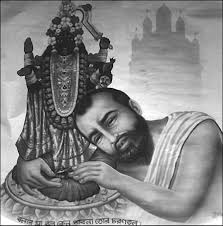Intense longing enables one to see God

Vedantic Non-dualism
 "Therefore I say that in the light of Vedantic reasoning Brahman has no attributes. The real nature of Brahman cannot be described. But so long as your individuality is real, the world also is real, and equally real are the different forms of God and the feeling that God is a Person.
"Therefore I say that in the light of Vedantic reasoning Brahman has no attributes. The real nature of Brahman cannot be described. But so long as your individuality is real, the world also is real, and equally real are the different forms of God and the feeling that God is a Person.
Seven planes of the mind
"The sixth plane is at the forehead. When the mind reaches it, the aspirant sees the form of God day and night. But even then a little trace of ego remains. At the sight of that incomparable beauty of God's form, one becomes intoxicated and rushes forth to touch and embrace it. But one doesn't succeed. It is like the light inside a lantern. One feels as if one could touch the light, but one cannot on account of the pane of glass.
BRAHMO DEVOTEE: "What are the means by which one can see God?"
MASTER: "Can you weep for Him with intense longing of heart? Men shed a jugful of tears for the sake of their children, for their wives, or for money. But who weeps for God? So long as the child remains engrossed with its toys, the mother looks after her cooking and other household duties. But when the child no longer relishes the toys, it throws them aside and yells for its mother. Then the mother takes the rice-pot down from the hearth, runs in haste, and takes the child in her arms."
Why so much controversy about God?
BRAHMO DEVOTEE: "Sir, why are there so many different opinions about the nature of God? Some say that God has form, while others say that He is formless. Again, those who speak of God with form tell us about His different forms. Why all this controversy?"
MASTER: "A devotee thinks of God as he sees Him. In reality there is no confusion about God. God explains all this to the devotee if the devotee only realizes Him somehow. You haven't set your foot in that direction. How can you expect to know all about God?
Parable of the chameleon
"Listen to a story. Once a man entered a wood and saw a small animal on a tree. He came back and told another man that he had seen a creature of a beautiful red colour on a certain tree. The second man replied: 'When I went into the wood, I also saw that animal. But why do you call it red? It is green.' Another man who was present contradicted them both and insisted that it was yellow. Presently others arrived and contended that it was grey, violet, blue, and so forth and so on. At last they started quarrelling among themselves.
To settle the dispute they all went to the tree. They saw a man sitting under it. On being asked, he replied: 'Yes, I live under this tree and I know the animal very well. All your descriptions are true. Sometimes it appears red, sometimes yellow, and at other times blue, violet, grey, and so forth. It is a chameleon. And sometimes it has no colour at all. Now it has a colour, and now it has none.'
"In like manner, one who constantly thinks of God can know His real nature; he alone knows that God reveals Himself to seekers in various forms and aspects. God has attributes; then again He has none. Only the man who lives under the tree knows that the chameleon can appear in various colours, and he knows, further, that the animal at times has no colour at all. It is the others who suffer from the agony of futile argument.
"Kabir used to say, 'The formless Absolute is my Father, and God with form is my Mother.'"God reveals Himself in the form which His devotee loves most. His love for the devotee knows no bounds. It is written in the Purana that God assumed the form of Rama for His heroic devotee, Hanuman.
"The forms and aspects of God disappear when one discriminates in accordance with the Vedanta philosophy. The ultimate conclusion of such discrimination is that Brahman alone is real and this world of names and forms illusory. It is possible for a man to see the forms of God, or to think of Him as a Person, only so long as he is conscious that he is a devotee. From the standpoint of discrimination this 'ego of a devotee' keeps him a little away from God.
"Do you know why images of Krishna or Kāli are three and a half cubits high? Because of distance. Again, on account of distance the sun appears to be small. But if you go near it you will find the sun so big that you won't be able to comprehend it. Why have images of Krishna and Kāli a dark-blue colour? That too is on account of distance, like the water of a lake, which appears green, blue, or black from a distance. Go near, take the water in the palm of your hand, and you will find that it has no colour. The sky also appears blue from a distance. Go near and you will see that it has no colour at all.
"Yours is the path of bhakti. That is very good; it is an easy path. Who can fully know the infinite God? and what need is there of knowing the Infinite? Having attained this rare human birth, my supreme need is to develop love for the Lotus Feet of God.
"If a jug of water is enough to remove my thirst, why should I measure the quantity of water in a lake? I become drunk on even half a bottle of wine-what is the use of my calculating the quantity of liquor in the tavern? What need is there of knowing the Infinite?
"The various states of mind of the Brahmajnani are described in the Vedas. The path of knowledge is extremely difficult. One cannot obtain jnāna if one has the least trace of worldliness and the slightest attachment to 'woman and gold'. This is not the path for the Kaliyuga.
"The Vedas speak of seven planes where the mind dwells. When the mind is immersed in worldliness it dwells in the three lower planes- at the naval, the organ of generation, and the organ of evacuation. In that state the mind loses all its higher visions-it broods only on 'woman and gold'. The fourth plane of the mind is at the heart. When the mind dwells there, one has the first glimpse of spiritual consciousness. One sees light all around. Such a man, perceiving the divine light, becomes speechless with wonder and says: 'Ah! What is this? What is this?' His mind does not go downward to the objects of the world.
"The fifth plane of the mind is at the throat. When the mind reaches this, the aspirant becomes free from all ignorance and illusion. He does not enjoy talking or hearing about anything but God. If people talk about worldly things, he leaves the place at once.
"In the top of the head is the seventh plane. When the mind rises there, one goes into samādhi. Then the Brahmajnani directly perceives Brahman. But in that state his body does not last many days. He remains unconscious of the outer world. If milk is poured into his mouth, it runs out. Dwelling on this plane of consciousness, he gives up his body in twenty-one days. That is the condition of the Brahmajnani. But yours is the path of devotion. That is a very good and easy path.
"Once a man said to me, 'Sir, can you teach me quickly the thing you call samādhi?' (All laugh.)